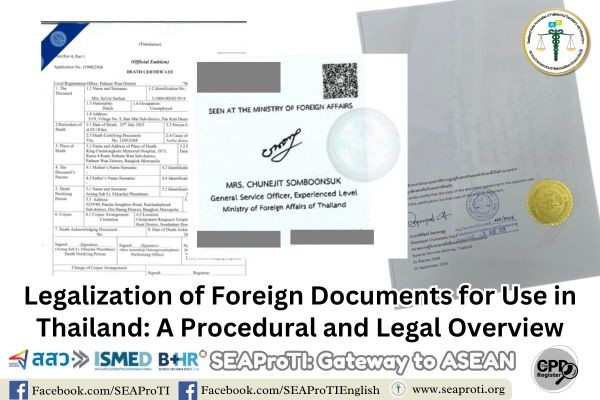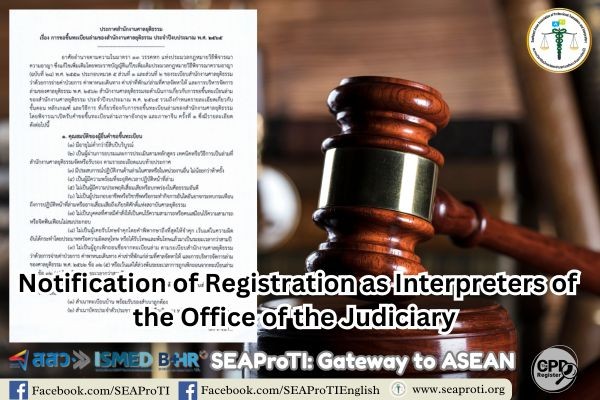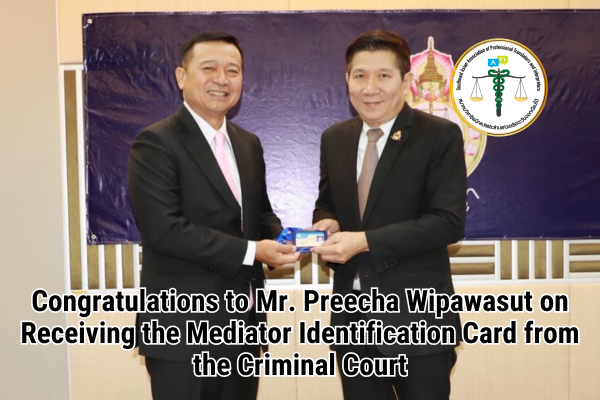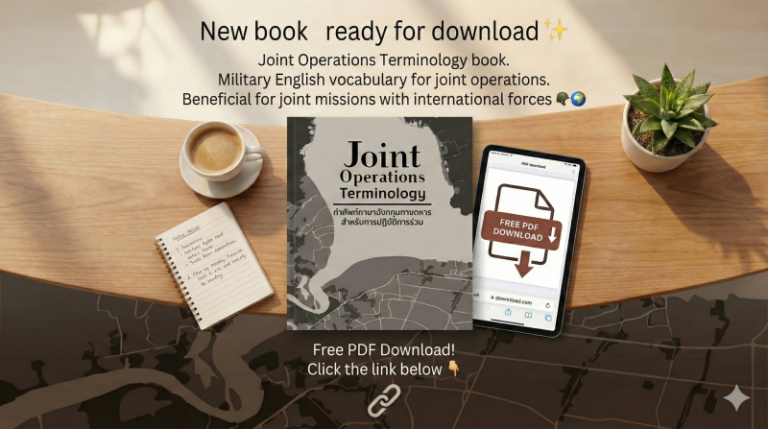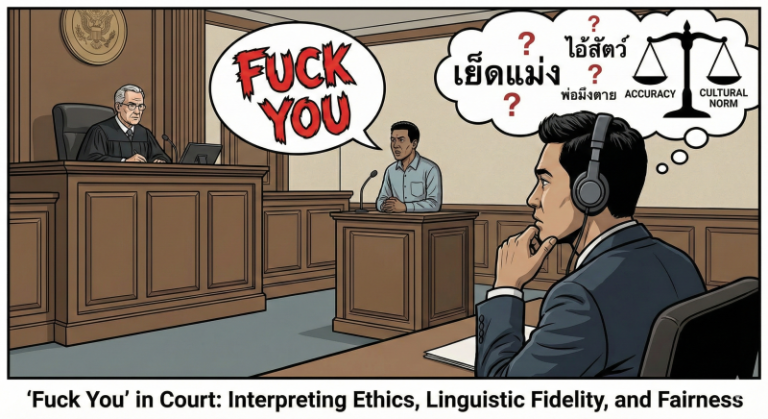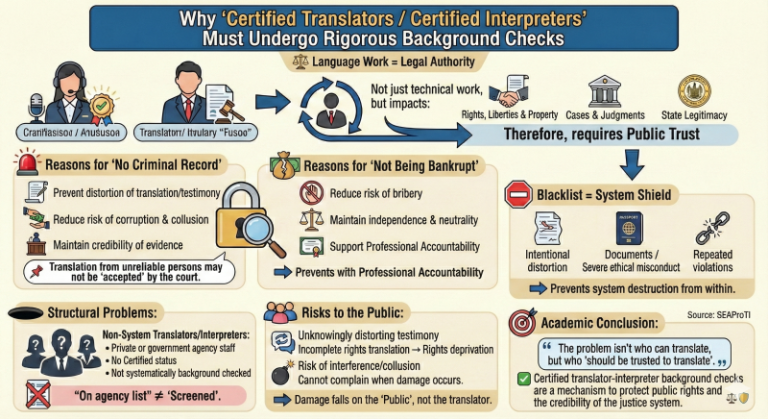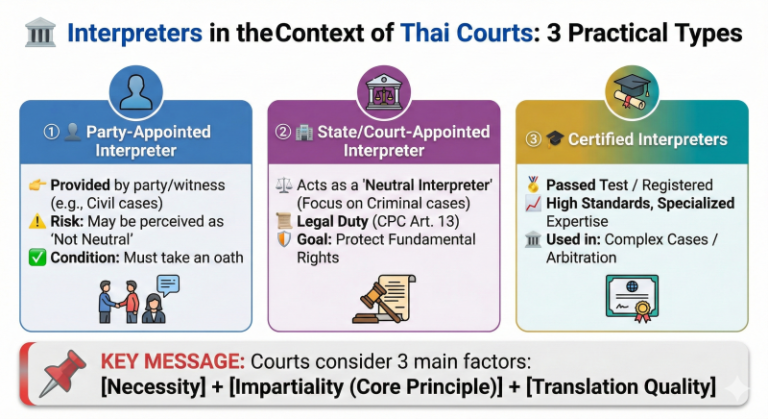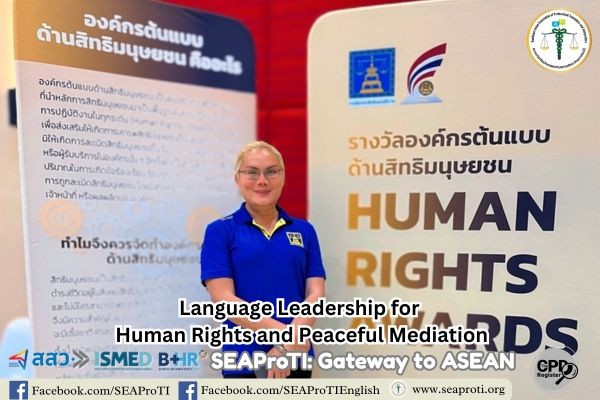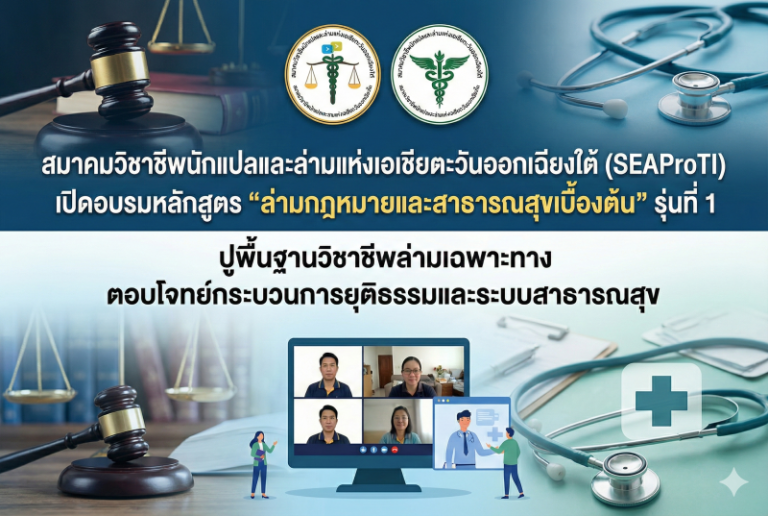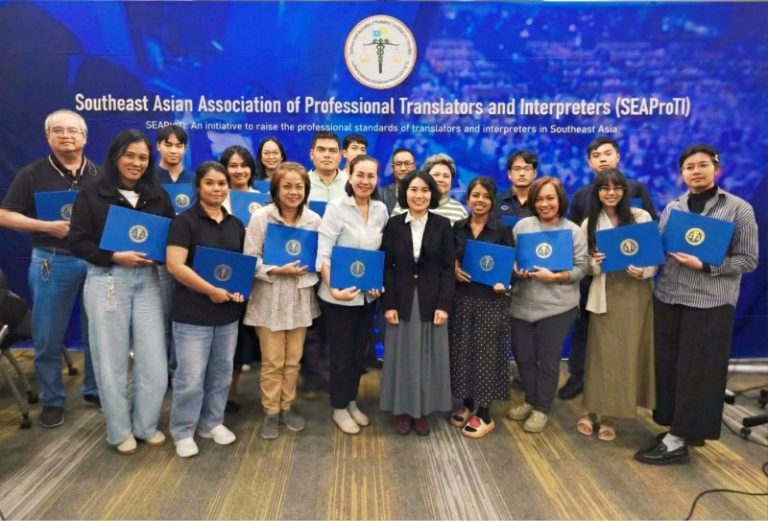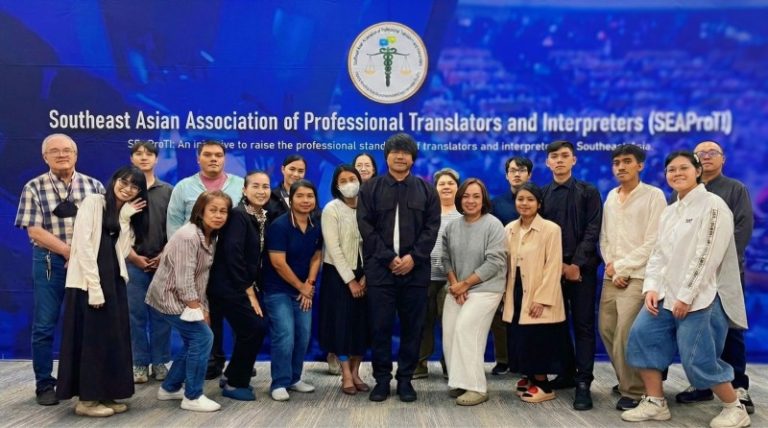Legalization of Foreign Documents for Use in Thailand: A Procedural and Legal Overview
18 October 2025, Bangkok – This article outlines the procedural and legal framework for the legalization of foreign documents for use in Thailand. It discusses the authentication chain required by Thai authorities, the translation and notarization standards expected by the Ministry of Foreign Affairs (MFA), and the distinction between consular legalization and the apostille system. The analysis emphasizes accuracy in translation, procedural compliance, and the evolving use of digital verification mechanisms introduced by the MFA.
In an increasingly globalized legal and administrative environment, cross-border document recognition has become a fundamental requirement for individuals and entities engaging in international activities. Thailand, while not a party to the Hague Apostille Convention, maintains a structured consular legalization process that ensures the authenticity and reliability of foreign documents before they are admitted for official use. This article provides a step-by-step guide to the legalization process and highlights common procedural challenges faced by applicants.
Authentication in the Issuing Country
The legalization process begins in the document’s country of origin. The applicant must obtain either the original or a certified copy and complete a hierarchical authentication sequence through relevant authorities—typically from the local or state authority, to the national foreign ministry (e.g., the U.S. Department of State or the UK Foreign, Commonwealth & Development Office), and finally to the Royal Thai Embassy or Consulate in that country.
This final consular legalization confirms the authenticity of the document and its signatures, forming the prerequisite for recognition in Thailand (Ministry of Foreign Affairs, 2025).
Translation into Thai
Once consular legalization is complete, the document must be translated into Thai. This translation must be carried out by a certified translator recognized by the Ministry of Foreign Affairs or a professional body such as the Southeast Asian Association of Professional Translators and Interpreters (SEAProTI). Translators are responsible for ensuring that all names, dates, and reference numbers match the source document precisely. Errors or inconsistencies can result in rejection by the MFA during the legalization process.
The translation may also require notarization by a Notarial Services Attorney, particularly if the receiving Thai authority (e.g., a court or ministry) specifies this requirement. Consistency in formatting, transliteration of foreign names, and date conversion (from the Gregorian to the Buddhist Era calendar) is essential for acceptance (SEAProTI, 2024).
Final Legalization by the Thai Ministry of Foreign Affairs
After translation, both the legalized foreign document and its Thai translation are submitted to the Department of Consular Affairs, Ministry of Foreign Affairs (MFA) for final legalization. Since 2025, the MFA requires advance online appointments through its official platform, and all legalized documents now bear a QR-code verification seal for digital traceability (MFA, 2025).
Applicants should allow one to three weeks for processing, depending on document type and volume. Legalization services are available at the Chaeng Watthana Government Complex and regional branches across Thailand.
The Meaning of “Certified Translation” in Thailand
In Thailand, the term “certified translation” is frequently misunderstood and used inconsistently across administrative and professional contexts. Within domestic practice, it often denotes a translation accompanied by a signed and stamped declaration by the translator, attesting that the translated text is a true and complete rendering of the original document. However, in professional and international contexts, the term carries a more specific and regulated meaning: a certified translation is one produced by a certified translator—a professional who has successfully undergone formal peer evaluation and credentialing by an authorized body.
The Southeast Asian Association of Professional Translators and Interpreters (SEAProTI) currently serves as the principal professional organization in Thailand responsible for conducting peer certification and licensing of translators and interpreters. SEAProTI-certified translators are authorized to issue certified translations within their areas of specialization. Their certification represents verified competence in linguistic accuracy, ethical integrity, and procedural reliability, aligning with internationally recognized professional standards.
It is important to note that Thailand does not issue any government translator license, nor does the Ministry of Foreign Affairs (MFA) certify or accredit translators. The MFA’s role is limited strictly to verifying signatures and authenticating documents—it does not assess the linguistic or substantive quality of a translation. Consequently, any claim of being “MFA-certified” or “MFA-accredited” is misleading and professionally inappropriate, as it misrepresents the nature of the MFA’s administrative function and may cause confusion regarding the authenticity or professional status of the translator.
Submission to the Thai Receiving Authority
Once legalization is complete, the document set can be submitted to the relevant Thai authority, such as those handling immigration, marriage registration, business licensing, education, or court proceedings. Requirements vary, and applicants should confirm any additional templates, photo attachments, or notarization needs before submission.
Apostille vs. Consular Legalization
Thailand is not a signatory to the 1961 Hague Apostille Convention; therefore, an apostilled document alone is invalid for use in Thailand. Instead, the country requires the full consular legalization chain, concluding with the Royal Thai Embassy or Consulate and final authentication by the Thai MFA (Hague Conference on Private International Law, 2023).
This distinction is crucial for applicants from apostille member states who may assume that apostilled documents are universally recognized.
Practical Recommendations
Verify authority requirements early: Each Thai government agency may impose unique documentation or format standards.
Book MFA appointments well in advance, particularly during peak seasons.
Ensure translation consistency across name spellings, numerals, and document structure.
Avoid uncertified translators, as rework or rejection may occur at the legalization stage.
Conclusion
The legalization of foreign documents for use in Thailand remains a multi-step process emphasizing both procedural integrity and linguistic accuracy. While recent digital innovations—such as QR-coded verification—have modernized the system, applicants must still navigate traditional authentication layers. The role of certified translators remains central, bridging linguistic and legal domains to ensure cross-border document validity.
- Hague Conference on Private International Law. (2023). Apostille Convention Status Table. Retrieved from https://www.hcch.net/en/instruments/conventions/status-table/?cid=41
- Ministry of Foreign Affairs of Thailand. (2025). Guidelines for Legalization and Authentication of Foreign Documents. Department of Consular Affairs.
- Southeast Asian Association of Professional Translators and Interpreters (SEAProTI). (2024). Certified Translation and Legalization Standards in Thailand. Bangkok: SEAProTI Press.
The Southeast Asian Association of Professional Translators and Interpreters (SEAProTI) has formally announced the qualifications and requirements for registration of Certified Translators, Translation Certification Providers, and Certified Interpreters in Sections 9 and 10 of the Royal Gazette, published by the Secretariat of the Cabinet, Office of the Prime Minister of Thailand, on 25 July 2024 (Vol. 141, Part 66 Ng, p. 100). Certified Translators, Translation Certification Providers, and Certified Interpreters
The Council of State has proposed the enactment of a Royal Decree, granting registered translators and recognized translation certifiers from professional associations or accredited language institutions the authority to provide legally valid translation certification (Letter to SEAProTI dated April 28, 2025)
SEAProTI is the first professional association in Thailand and Southeast Asia to implement a comprehensive certification system for translators, certifiers, and interpreters.
Head Office: Baan Ratchakru Building, No. 33, Room 402, Soi Phahonyothin 5, Phahonyothin Road, Phaya Thai District, Bangkok 10400, Thailand
Email: hello@seaproti.com | Tel.: (+66) 2-114-3128 (Office hours: Mon–Fri, 09:00–17:00)
การรับรองเอกสารจากต่างประเทศเพื่อใช้ในประเทศไทย: ภาพรวมด้านกระบวนการและกฎหมาย
18 ตุลาคม 2568 กรุงเทพฯ — บทความนี้อธิบายกรอบกฎหมายและขั้นตอนการรับรองเอกสารจากต่างประเทศเพื่อให้สามารถใช้ในประเทศไทยได้อย่างถูกต้องตามกฎหมาย โดยกล่าวถึงลำดับขั้นตอนการตรวจสอบความถูกต้องของเอกสารตามที่หน่วยงานของไทยกำหนด มาตรฐานการแปลและการรับรองเอกสารตามแนวทางของกระทรวงการต่างประเทศ (กต.) ตลอดจนการเปรียบเทียบระหว่าง “การรับรองกงสุล” (Consular Legalization) และ “ระบบอาโพสทีล” (Apostille System) ทั้งนี้ บทความยังเน้นความสำคัญของความถูกต้องในการแปล การปฏิบัติตามกระบวนการ และการปรับใช้ระบบตรวจสอบเอกสารแบบดิจิทัลของ กต. ในยุคปัจจุบัน
ความสำคัญของการรับรองเอกสารข้ามพรมแดน
ในยุคโลกาภิวัตน์ การยอมรับเอกสารจากต่างประเทศถือเป็นสิ่งจำเป็นสำหรับบุคคลและนิติบุคคลที่ดำเนินกิจกรรมระหว่างประเทศ ประเทศไทยแม้จะยังไม่ได้เป็นภาคีอนุสัญญาเฮกว่าด้วยอาโพสทีล (Hague Apostille Convention) แต่ได้กำหนดระบบการรับรองเอกสารโดยผ่านกงสุลไว้อย่างเป็นขั้นตอน เพื่อยืนยันความถูกต้องและความน่าเชื่อถือของเอกสารก่อนนำมาใช้ภายในประเทศ
ขั้นตอนที่ 1: การรับรองเอกสารในประเทศต้นทาง
กระบวนการเริ่มต้นที่ประเทศผู้ออกเอกสาร โดยผู้ยื่นต้องขอเอกสารต้นฉบับหรือสำเนารับรองถูกต้อง และดำเนินการตรวจสอบลำดับขั้นตามลำดับจากหน่วยงานท้องถิ่น หน่วยงานระดับรัฐ หรือกระทรวงการต่างประเทศของประเทศนั้น (เช่น U.S. Department of State หรือ UK Foreign, Commonwealth & Development Office) ก่อนนำเอกสารไปให้สถานเอกอัครราชทูตหรือสถานกงสุลใหญ่ไทยในประเทศนั้นลงนามรับรองเป็นขั้นสุดท้าย
การรับรองโดยกงสุลไทยถือเป็นหลักฐานยืนยันความแท้ของลายเซ็นและเอกสาร ซึ่งเป็นเงื่อนไขเบื้องต้นก่อนการนำเอกสารมาใช้ในประเทศไทย (กระทรวงการต่างประเทศ, 2568)
ขั้นตอนที่ 2: การแปลเอกสารเป็นภาษาไทย
เมื่อเอกสารได้รับการรับรองโดยสถานทูตหรือสถานกงสุลไทยแล้ว จะต้องแปลเป็นภาษาไทยโดยนักแปลที่ได้รับการรับรองจากกระทรวงการต่างประเทศ หรือจากองค์กรวิชาชีพ เช่น สมาคมนักแปลและล่ามอาเซียน (SEAProTI)
นักแปลต้องตรวจสอบให้แน่ใจว่าชื่อ วันที่ และตัวเลขตรงกับต้นฉบับทุกประการ ความผิดพลาดเพียงเล็กน้อยอาจทำให้ กต. ปฏิเสธการรับรองได้ นอกจากนี้ บางกรณีอาจต้องมีการรับรองโดยทนายความผู้ให้บริการโนตารีพับลิก (Notarial Services Attorney) หากหน่วยงานไทยที่รับเอกสารกำหนดไว้
การถอดเสียงชื่อบุคคลต่างประเทศ การจัดรูปแบบเอกสาร และการแปลงปีคริสต์ศักราชเป็นพุทธศักราชต้องถูกต้องตามแบบแผน (SEAProTI, 2567)
ขั้นตอนที่ 3: การรับรองขั้นสุดท้ายโดยกระทรวงการต่างประเทศ
หลังจากการแปล เอกสารทั้งต้นฉบับและฉบับแปลต้องนำไปยื่นรับรองที่ กรมการกงสุล กระทรวงการต่างประเทศ (กต.)
ตั้งแต่ปี 2568 เป็นต้นมา ผู้ยื่นจะต้องจองคิวออนไลน์ล่วงหน้าผ่านระบบของ กต. และเอกสารที่ผ่านการรับรองแล้วจะมี รหัส QR สำหรับตรวจสอบความถูกต้องแบบดิจิทัล (กต., 2568)
ระยะเวลาดำเนินการโดยทั่วไปอยู่ระหว่าง 1–3 สัปดาห์ ขึ้นอยู่กับประเภทและจำนวนเอกสาร โดยสามารถยื่นได้ที่ศูนย์ราชการเฉลิมพระเกียรติฯ แจ้งวัฒนะ หรือสำนักงานกงสุลภูมิภาคทั่วประเทศ
ความหมายของคำว่า “การแปลรับรอง” (Certified Translation) ในประเทศไทย
- คำว่า “การแปลรับรอง” มักถูกใช้ผิดความหมายในประเทศไทย โดยทั่วไปมักหมายถึงการแปลที่มีการลงชื่อและประทับตรารับรองโดยผู้แปลว่างานแปลถูกต้องครบถ้วนตามต้นฉบับ
- แต่ในระดับวิชาชีพและระดับนานาชาติ “การแปลรับรอง” หมายถึงงานแปลที่จัดทำโดย นักแปลรับรอง (Certified Translator) ซึ่งผ่านการประเมินและรับรองคุณสมบัติจากองค์กรวิชาชีพที่มีอำนาจ
SEAProTI เป็นองค์กรหลักในประเทศไทยที่ทำหน้าที่รับรองและออกใบอนุญาตวิชาชีพนักแปลและล่าม นักแปลที่ได้รับการรับรองจาก SEAProTI สามารถออกใบแปลรับรองในสาขาความเชี่ยวชาญของตนได้ โดยมีมาตรฐานด้านความถูกต้องทางภาษา จริยธรรม และความน่าเชื่อถือในระดับสากล
ทั้งนี้ ประเทศไทย ยังไม่มีระบบใบอนุญาตนักแปลของรัฐ และกระทรวงการต่างประเทศ ไม่ได้รับรองหรือตรวจสอบคุณภาพการแปล แต่มีหน้าที่เพียงตรวจสอบลายเซ็นและความถูกต้องของเอกสารเท่านั้น ดังนั้น การอ้างว่าเป็น “นักแปลที่ได้รับการรับรองจาก กต.” หรือ “MFA-certified translator” จึงเป็นการอ้างที่ คลาดเคลื่อนและไม่เหมาะสมทางวิชาชีพ
ขั้นตอนที่ 4: การยื่นต่อหน่วยงานไทยที่เกี่ยวข้อง
เมื่อเอกสารถูก กต. รับรองแล้ว สามารถนำไปยื่นต่อหน่วยงานไทยที่เกี่ยวข้อง เช่น ศาล กรมการปกครอง สำนักงานตรวจคนเข้าเมือง หรือกระทรวงอื่น ๆ ได้ ทั้งนี้ ควรตรวจสอบล่วงหน้าว่าหน่วยงานนั้นมีข้อกำหนดเพิ่มเติมใดบ้าง เช่น แบบฟอร์มเฉพาะ ภาพถ่าย หรือการรับรองเพิ่มเติมโดยโนตารี
ความแตกต่างระหว่าง “Apostille” และ “Consular Legalization”
- ประเทศไทย ไม่ได้เป็นภาคีอนุสัญญาเฮกว่าด้วยอาโพสทีล ปี 1961 (Hague Apostille Convention) ดังนั้นเอกสารที่ประทับตรา Apostille เพียงอย่างเดียว ไม่สามารถใช้ได้ในประเทศไทย
- ผู้ยื่นจำเป็นต้องดำเนินการตามขั้นตอนการรับรองกงสุลครบทุกขั้นตอน โดยจบที่สถานทูตหรือสถานกงสุลไทย และรับรองขั้นสุดท้ายโดย กต. (Hague Conference on Private International Law, 2566)
- ตรวจสอบข้อกำหนดของหน่วยงานปลายทางตั้งแต่ต้น
- จองคิว กต. ล่วงหน้า โดยเฉพาะช่วงที่มีผู้ใช้บริการมาก
- รักษาความสม่ำเสมอของชื่อ ตัวเลข และรูปแบบเอกสารในการแปล
- ใช้นักแปลที่ได้รับการรับรองเท่านั้น เพื่อหลีกเลี่ยงการถูกปฏิเสธหรือให้แก้ไข
บทสรุป
การรับรองเอกสารจากต่างประเทศเพื่อใช้ในประเทศไทยเป็นกระบวนการหลายขั้นตอนที่มุ่งรักษาความถูกต้องและความน่าเชื่อถือของเอกสาร แม้ปัจจุบัน กต. จะนำระบบตรวจสอบแบบดิจิทัล (QR Code Verification) มาใช้แล้ว แต่ผู้ยื่นยังคงต้องปฏิบัติตามขั้นตอนตามกฎหมายและระเบียบอย่างครบถ้วน
นักแปลรับรองจึงยังคงมีบทบาทสำคัญในการเชื่อมโยงระหว่างภาษาและกฎหมาย เพื่อให้เอกสารจากต่างประเทศได้รับการยอมรับอย่างถูกต้องในประเทศไทย
- Hague Conference on Private International Law. (2023). Apostille Convention Status Table. Retrieved from https://www.hcch.net/en/instruments/conventions/status-table/?cid=41
- กระทรวงการต่างประเทศ. (2568). แนวทางการรับรองเอกสารจากต่างประเทศและการตรวจสอบเอกสาร. กรมการกงสุล.
- สมาคมนักแปลและล่ามอาเซียน (SEAProTI). (2567). มาตรฐานการแปลรับรองและการรับรองเอกสารในประเทศไทย. กรุงเทพฯ: สำนักพิมพ์ SEAProTI.
สมาคมวิชาชีพนักแปลและล่ามแห่งเอเชียตะวันออกเฉียงใต้ (SEAProTI) ได้ประกาศหลักเกณฑ์และคุณสมบัติผู้ที่ขึ้นทะเบียนเป็น “นักแปลรับรอง (Certified Translators) และผู้รับรองการแปล (Translation Certification Providers) และล่ามรับรอง (Certified Interpreters)” ของสมาคม หมวดที่ 9 และหมวดที่ 10 ในราชกิจจานุเบกษา ของสำนักเลขาธิการคณะรัฐมนตรี ในสำนักนายกรัฐมนตรี แห่งราชอาณาจักรไทย ลงวันที่ 25 ก.ค. 2567 เล่มที่ 141 ตอนที่ 66 ง หน้า 100 อ่านฉบับเต็มได้ที่: นักแปลรับรอง ผู้รับรองการแปล และล่ามรับรอง
สำนักคณะกรรมการกฤษฎีกาเสนอให้ตราเป็นพระราชกฤษฎีกา โดยกำหนดให้นักแปลที่ขึ้นทะเบียน รวมถึงผู้รับรองการแปลจากสมาคมวิชาชีพหรือสถาบันสอนภาษาที่มีการอบรมและขึ้นทะเบียน สามารถรับรองคำแปลได้ (จดหมายถึงสมาคม SEAProTI ลงวันที่ 28 เม.ย. 2568)
สมาคมวิชาชีพนักแปลและล่ามแห่งเอเชียตะวันออกเฉียงใต้ เป็นสมาคมวิชาชีพแห่งแรกในประเทศไทยและภูมิภาคเอเชียตะวันออกเฉียงใต้ที่มีระบบรับรองนักแปลรับรอง ผู้รับรองการแปล และล่ามรับรอง
สำนักงานใหญ่: อาคารบ้านราชครู เลขที่ 33 ห้อง 402 ซอยพหลโยธิน 5 ถนนพหลโยธิน แขวงพญาไท เขตพญาไท กรุงเทพมหานคร 10400 ประเทศไทย
อีเมล: hello@seaproti.com โทรศัพท์: (+66) 2-114-3128 (เวลาทำการ: วันจันทร์–วันศุกร์ เวลา 09.00–17.00 น.)


